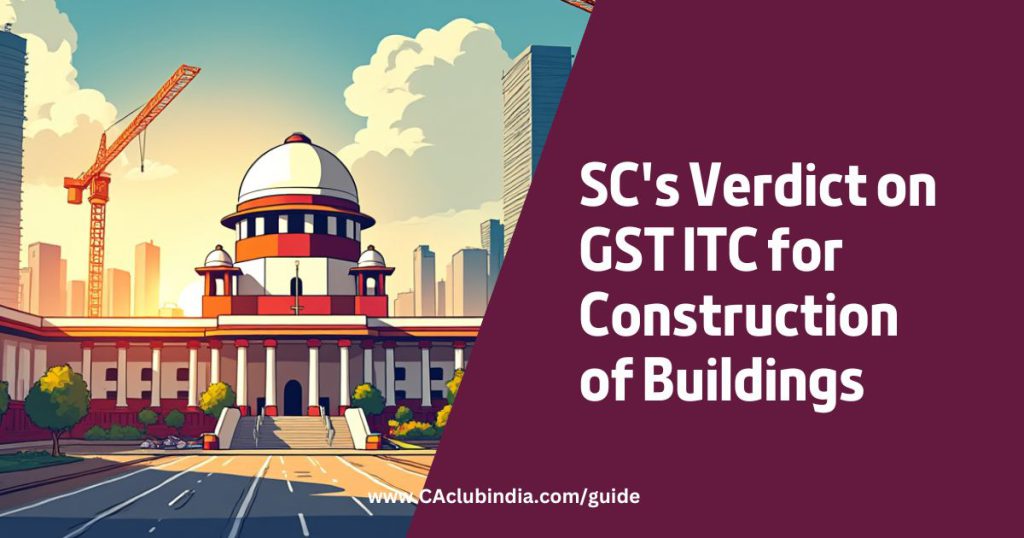GST ITC for construction of buildings, now it can be claim by businesses treating buildings as “plant,” under the CGST Act.
Recently, the Supreme Court has opened the doors to claim Input Tax Credit (ITC) on GST paid on inputs used for the construction of commercial buildings like malls, offices and factories.

This is a landmark verdict pertaining to the construction of an immovable property (shopping mall in this case) to let out premises in the mall to different tenants on which such GST output liability is to be paid. This was the most awaited decision by the Supreme Court.
Provisions as per the Act in case of ineligible ITC
Section 17(5)(c) of the CGST Act states that it disallows the claiming of ITC on “works contract services when supplied for construction of an immovable property (other than plant and machinery) except where it is an input service for further supply of works contract service.”
Section 17(5)(d) of the CGST Act generally disallows the claiming of ITC on “goods or services or both received by a taxable person for construction of an immovable property (other than plant or machinery) on his own account including when such goods or services or both are used in the course or furtherance of business.”
This was held in the case of the Chief Commissioner of Central Goods and Service Tax & Ors. v/s M/s Safari Retreats Private Ltd. & Ors. Vide CIVIL APPEAL NO. 2948 OF 2023 dated 03.10.2024.
Facts of the case
- The assessee (Safari Retreats Pvt Ltd) is engaged in the construction of a shopping mall and letting out premises in the mall to different tenants.
- Inputs such as cement, sand, steel, wires, lifts and other services are required for the construction of such malls.
- The ITC was not made available and was denied on such inputs in the construction of shopping mall. But GST was levied on the rental income for such space given to tenants.
- Previously, the Odisha High Court gave a favourable decision which held that the ITC on goods and services used for the construction of the mall cannot be denied under section 17(5)(d) of the CGST Act (TS-350-HC-2019(ORI)-NT).
- It was also stated that such construction materials were not used for personal consumption.
- Imposing GST on the rent collected and denying ITC on such inputs is against fundamental/constitutional rights (Article 14, 19 and 300A of the Constitution of India) as right to avail ITC is a statutory right.
- Further, the Revenue Authorities challenged the Hon’ble Odisha High Court judgement before the Supreme Court.
Submissions by the Assessee
- Section 17(5)(d) is violative of Article 14 of the Constitution since it classifies assessees engaged in the business of constructing immovable properties and then renting/leasing/letting out etc. premises within the said immovable properties on the same footing as assessees engaged in the business of constructing immovable properties and then selling the immovable properties or premises within the said immovable properties.
- The distinction between the expression “plant and machinery” used in Section 17(5)(c) and the expression “plant or machinery” used in Section 17(5)(d) has not been clarified by the Government.
- It was also submitted that if a provision is very vague, it can be struck down.
- The receipt of rental income and tax payable are direct consequences of the construction undertaken. By blocking the ITC on the rentals collected by the assessee who has constructed the building, the State is unjustly enriching itself and violating the right to avail ITC flowing from Section 300A of the Constitution of India.
- ITC is blocked for suppliers who procure taxable works contract services, goods or services on the input side and then provide taxable supplies on the output side. Based on the above contentions submitted by the assessee, ITC should be allowed for business expenditure.
Interpretation of Section 17(5)(d) & Submissions by the Revenue Authorities
- The expression “plant or machinery” must be read as “plant and machinery”.
- ITC would be available on malls or warehouses but would not be available on works contracts related to such construction of a mall or warehouse.
- Further, it was submitted that depreciation cannot be claimed if ITC is availed.
- Tax on goods cannot be extended to immovable property. However, taxation on services can be raised even on using immovable properties for rendition of services.
- It was also submitted that since a shopping mall is an immovable property, it is outside the purview of GST (where GST is not payable), ITC shall not be granted for the same.
- In case, if the mall is used to render renting service for five years and then is sold after five years, no GST will be payable on the sale. However, if ITC is allowed as contended during these five years, ITC will be exhausted against GST payable on rental income. Thereafter, the mall would be sold without paying any tax, which would cause a substantial monetary loss.
- It was pointed out that the construction of a complex building intended for sale to a buyer will be treated as a supply of service except where the entire consideration has been received after the issuance of the commencement certificate.
- The supply of a constructed building complex or a civil structure before the issuance of the completion certificate can be construed as a supply of services and will be liable to GST. The dividing line is the issuance of a completion certificate.
- A supply prior to the issuance of the commencement certificate is treated as a supply of service, whereas a sale made after the issuance of the completion certificate is not treated as a supply of service.
Rulings of the Hon’ble Supreme Court
The expression “plant or machinery” used in Section 17(5)(d) cannot be given the same meaning as the expression “plant and machinery” defined by the explanation to Section 17. The Supreme Court observed that the word “plant” cannot be restricted to the definition of “plant and machinery”.
The question of whether a mall, warehouse or any building other than a hotel or a cinema theatre can be classified as a plant within the meaning of the expression “plant or machinery” used in Section 17(5)(d) is a factual question which has to be determined keeping in mind the business of the registered person and the role that building plays in the said business.
A functionality test will have to be conducted to decide whether the construction of a building was essential to carry out the activity of supplying services such as renting or leasing or any other activity.
It is to be closely looked into whether in the given case, a shopping mall would be considered as a “plant” in terms of Section 17(5)(d). Each case will have to be decided on its merit by applying the functionality test in terms of this judgment.
Case studies referred
- Eicher Motors Limited & Anr. v. Union of India & Ors.
- Bharat Sanchar Nigam Limited & Anr. v. Union of India & Ors.
- Shreya Singhal v. Union of India
- Federation of Hotel & Restaurant Association of India, etc. v. Union of India and Ors.
- Jindal Stainless Ltd. and Anr. v. State of Haryana and Ors.
- State of Tamil Nadu and Anr. v. National South Indian River Interlinking Agriculturist Association
- Sanjeev Coke Manufacturing Company v. M/s Bharat Coking Coal Ltd. & Anr
- Union of India & Anr v. Mohit Minerals Pvt. Ltd
- Indian Social Action Forum (INSAF) v. Union of India
- Indcon Structurals (P) Ltd. v. Commissioner of Central Excise, Chennai
The above information is only for informational purposes and does not constitute any legal advice. One can get an opinion from a tax professional or a Chartered Accountant to learn about taxation provisions.

